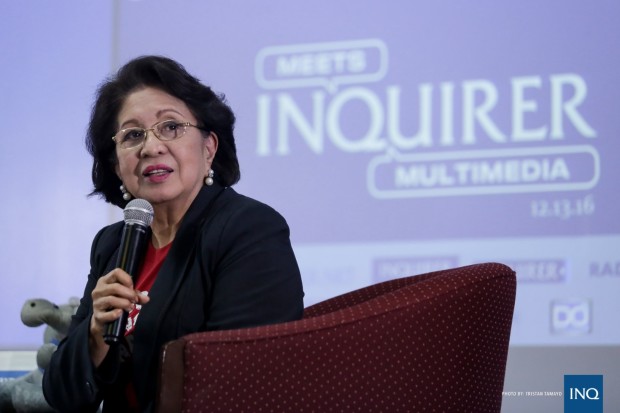Duterte ‘kill’ directive unacceptable

Ombudsman Conchita Carpio-Morales (File photo from TRISTAN TAMAYO/INUQUIRER.net)
Ombudsman Conchita Carpio Morales has spoken out for the first time against President Duterte’s take-no-prisoners approach to fighting crime, saying his directive to kill suspects was unacceptable.
“He’s goading people to kill people. That’s a problem,” Morales said in an interview with Japan’s NHK World television program on Thursday night.
“The directive to kill people under any situation, irrespective of how, irrespective of the context, to me, that’s not acceptable,” said Morales, a former Supreme Court justice and a Ramon Magsaysay laureate.
Thousands of people have died in police operations or vigilante-style killings since the President launched his war on drugs last year.
Reacting to her interview, presidential spokesperson Ernesto Abella on Friday suggested that Morales didn’t understand what the President had been wanting to convey by his words.
“Again and again, we’ve stated about how the President expresses himself and that particular statement may have been taken out of context,” Abella said.
Morales appeared to have anticipated such comments, saying in the interview that Mr. Duterte’s spokespersons would try to explain or justify his words but could not deny the impact of his message.
“His communications people say, ‘That’s hyperbole.’ You know, they try to rationalize whatever he says,” Morales said. “So, whether or not the police or whoever he addresses these words believe him—that’s a different story.”
On Wednesday, while addressing personnel from the Bureau of Jail Management and Penology, Mr. Duterte boasted that he was the only President who could openly order the killing of “those sons of bitches,” referring to drug suspects.
He said law enforcers should kill suspects if they fight back. “If they do not fight back, then make them,” Mr. Duterte said, reverting to his outrageous but increasingly familiar rhetoric against suspected criminals.
It was the first time that the often brutally frank Ombudsman, who was called the “Iron Lady of the Philippines” in the NHK interview, had commented against the conduct of Mr. Duterte’s bloody war on drugs.
At an Inquirer forum in December, Morales avoided making any direct comments against the President’s threats to kill criminals, saying only that “It’s not illegal to say ‘I will kill you.’”
The President was more emphatic on that point in a statement to diplomats on Friday.
“Find me a law, wherever you come from, point out to me a law in your country and in my country which says you cannot threaten a criminal from destroying your country,” he told delegates to the 11th Ambassadors’ Tour in Davao City. “Is there a law which says you cannot do it?”
The President said it was not fair that criminals could hide behind their human rights, particularly critics of his strong-arm tactics against those involved in illegal drugs.
Morales told NHK her office has received complaints “which have a bearing on extrajudicial killings, and which have a bearing on drugs,” especially against detained Sen. Leila de Lima, one of Mr. Duterte’s most outspoken critics.
“So we try to consolidate all these complaints and conduct a fact-finding investigation,” she added.
But time may not be on the side of Morales, who was plucked from retirement by former President Benigno Aquino III in July 2011. Her seven-year term will end next year.
Morales is related by affinity to the President. Her brother, Lucas Carpio Jr. is the father-in-law of Mr. Duterte’s daughter Sara Duterte-Carpio. —WITH REPORTS FROM PHILIP C. TUBEZA AND FRINSTON LIM